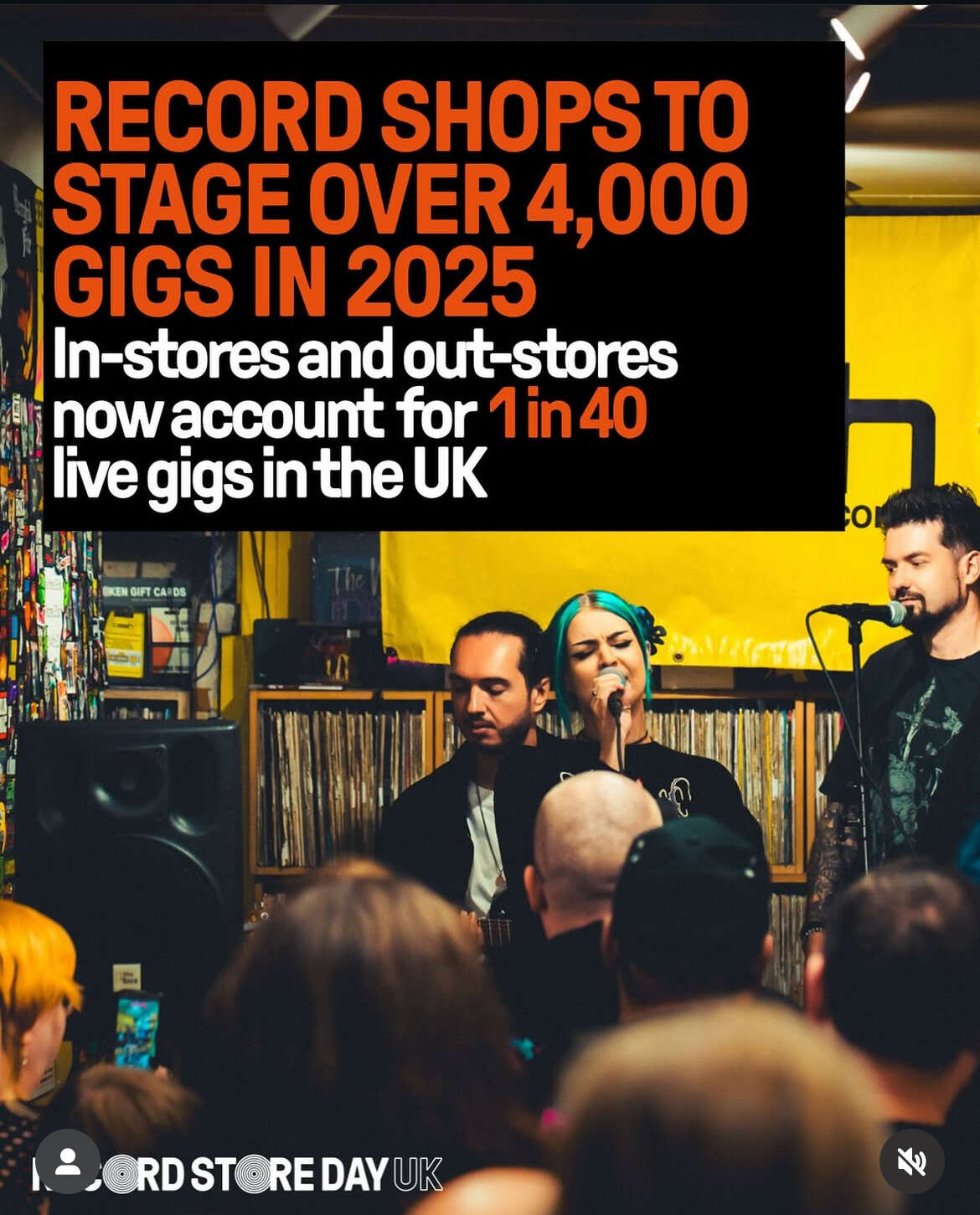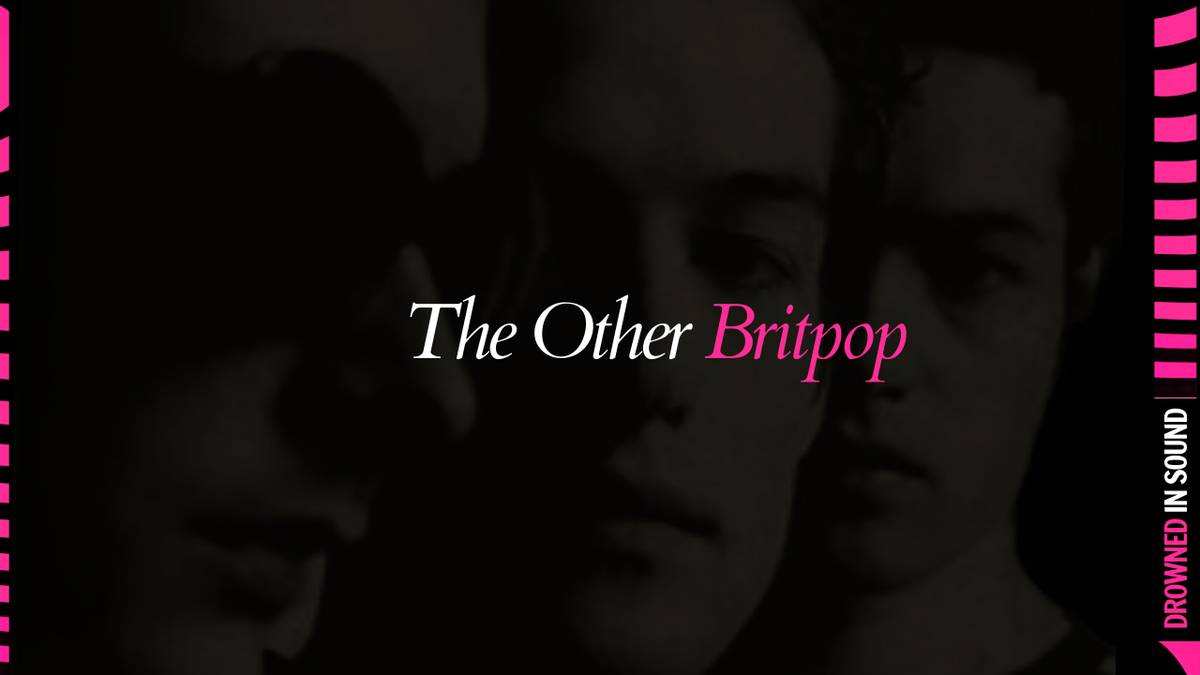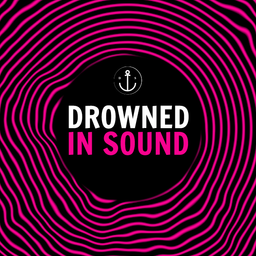This week:
- Sean and Emma chatted to Enter Shikari's Rou Reynolds for the podcast about grassroots music and how he decides what to speak about on stage
- We ponder the cultural dominance of large-scale summer shows
- How about some jazz punk for Track Of The Week?
- Find out about the band putting on a gig at Brixton Academy for the price of a chocolate bar
Summer is the season of sunburn, sweat, beer gardens and megagigs. The sky turns from its usual grey to its blue summer dress and live music goes outside, into stadiums, parks, fields, the grounds of stately homes et cetera. Tours between May and August have commonly been festival-filled, but in recent years we’ve seen the rise of what's been dubbed the “megagig”.
megagig (n.) - a large scale, usually corporate music event taking the form of stadium shows or as park festivals
Post-pandemic, you cannot move for megagigs. The last two summers have both had one central event devouring collective cultural attention. This year, it was inevitably Oasis. Last year, it was Taylor Swift. Anywhere with the capacity could host a megagig – see the Oasis shows in Manchester’s Heaton Park – but it’s an especially London-centric phenomenon. Perhaps I notice this more as London is the main city where I go to gigs, but it’s also a matter of resources given the capital’s plethora of both suitable stadiums and parks. Brockwell, Gunnersbury, Finsbury, Crystal Palace and Hyde Parks all play host to numerous events for a sliver each of the year. Victoria Park now does the honours twice, first with the new LIDO Festival in its Lido field in June, and then for All Points East in August. Inevitably, in the coming weeks after the dust (quite literally) settles on festival season, the machine will restart all over again as these events queue up to drop next year’s line-ups.
This phenomenon is something of a paradox. These huge corporate-sponsored events are thriving in a time where 60 per cent of British households are cutting back on non-essential spending in response to the cost of living continuing to climb. Perhaps it’s driven by a craving for real-world experiences in the era of home working and the desire to escape the mind-numbing fog of living life through a screen. Hard times, and long working hours, create an appetite for luxury to self-soothe. If there’s an accelerating appetite for, say, luxury coffees and matcha as a means of a treat, then maybe that’s the same for hitting purchase on big-name gig tickets. And, in the case of some artists – nostalgia is a cash cow. (Gallaghers, I’m looking at you). Live Nation reported in 2023 that global demand for live shows was “unprecedented”, while last year, a new report confirmed spending on live music and associated businesses had jumped by 17 per cent since 2022 to a record £6.1 billion.
Basic economics tells us that where there is demand, the suppliers rush in for their own slice of the pie. Huge shows, with an inevitable eye-watering mark-up on drinks and the like, are a chance for a financial gold rush. That said, it only goes so far. Over the May Bank Holiday I went to a megagig at the Lamex Stadium in Stevenage, where the venue did not reach more than a third of its capacity. Taking place on the same weekend as events such as south London’s Wide Awake and Slam Dunk in nearby Hatfield (with a northern counterpart in Leeds), it seemed the weekend was just too saturated. Later, a photo circulated of half-empty stadiums during Beyonce’s Cowboy Carter tour, the blame placed on the ticket prices (a general admission standing ticket cost £224.85) and the recency with which she last toured in 2023 for her album Renaissance. A friend of mine says there’s always one park festival he can secure cheap tickets for because it never sells well.
Beyoncé's first show outside the US for her Cowboy Carter tour. Most of the seats were empty.pic.twitter.com/SS1bz4HVmy
— victor🦄 (@beyisover) June 6, 2025
The irony is that the financial attraction of megagigs is their reliability. Big names, an easy draw, dependable fans with a decent level of certainty that the big spend will be worthwhile. Clearly, the demand for now is likely not going to dip. It’s the supply that’s worth asking questions about. The saturation point may now be skidding into view. Is there space for big new events that sell? What about the artists making the jump as a result of rising costs, selling more tickets to recoup what they spent? Choice abounds, but even as punters, it’s tiring to think about when there’s only so much money available to spend.
Perhaps the more concerning question is how far ‘peak megagig’ is tipping the scales of the live music ecosystem. There’s a sense of widening inequality between the largest gigs put on in the UK and the smallest ones. Of course, the economic benefits are huge when they rake in money for local businesses (and, in the case of park festivals, local councils), but it is troubling to picture large, corporate gigs flourishing while grassroots venues at the other end of the scale struggle to keep the lights on. Whether there’s cause-and-effect behind this is still unknown. As the Music Venue Trust’s Mark Davyd pointed out in an edition of his Substack newsletter two years ago, there’s not enough data to confirm that the megagig is absorbing cash that might otherwise be spent on anywhere between 10 and 20 grassroots gigs that would add up to the same value. However, he theorises that the explosion in the megagig at one end and the struggle of the grassroots sector are connected based on common sense – spending at the former reduces the ability to spend on the latter. It’s not going to singlehandedly choke the grassroots sector altogether, but with more data, its impact needs to be studied carefully. The same can be said for the effects on artists, who don't earn as much from festival shows - and the pittance Glastonbury pays, for example, was thrown into relief earlier this summer by this report in the Independent.
The megagig is always going to be a pillar of live music. It will always have a powerful draw; the question is just how powerful. For now, it is a case of watching and waiting, to see how it grows and changes, but the bubble is not totally going to burst.

And now, over to Rou...
Enter Shikari's Rou Reynolds is one of British music's most intelligent and vital advocates, speaking up for causes including the climate and Palestine for years longer than most. We had a great chat for this week's podcast about the grassroots levy, finding hope in the polycrisis and how he decides what to talk about on stage.
🎧 Subscribe for new episodes every Tuesday on Apple Podcasts, YouTube or search for "Drowned in Sound" wherever you get your podcasts.
Community Prompt - Your gigs of the summer
Top of the list of things I love about summer – beating out iced coffee and fresh berries – is the live shows. Festivals are the main reason I have to look forward to the season. If live music has been a fixture of your summer, which shows have stood out for you? A festival? A bucket list gig in a stadium? Or maybe an intimate festival side show?
I'll start:
- Green Day's life-affirming headline set at Download Festival was glorious to be a part of - especially when, during 'Wake Me Up When September Ends', Billie Joe Armstrong sang "Here comes the rain again," and it actually started raining.
- Mermaid Chunky at Glastonbury was absolutely bonkers, but so much fun, especially when they led the crowd in a big, silly group dance
- Olivia Rodrigo at Glastonbury made me - and my group of friends - cry more than I expected. Especially when she brought Robert Smith out.
- letlive.'s brief reunion at 2000trees (an independent festival I will recommend to anyone and everyone who loves rock music) in July was an utterly incendiary moment timed perfectly for the shitstorm that is 2025
- The Callous Daoboys' ArcTanGent side show at Kingston Fighting Cocks just a few weeks ago was a huge celebration of the fanbase they've garnered
- Chappell Roan at Reading, of course, which I wrote about here.
- Watching the bestial theatricality of Norwegian occult black metal trio Witch Club Satan at Supersonic over the weekend was one of the greatest things I've ever seen on stage
Track of the Week - Trenches by Maruja
The polycrisis is exhausting to exist through, but there are always reserves of strength to be found in music. Manchester jazz-punks Maruja exemplify this brilliantly. This new single is almost a converge of art punk and rap rock, like Rage Against The Machine have passed them the torch and they’re running with it in their own, individual way.
Their confrontational spirit on record translates into a thrilling live show too, which earned them a nod on our Class of 2025 longlist. I’ve seen them twice myself, first at London’s Village Underground last November and the second peering down from the top of the very steep, tree-strewn hill that is Strummerville at Glastonbury this summer. If they excite you enough now, the good news is their new album Pain To Power is out next Friday, and they’ll be on tour across the UK in November.
Check out and subscribe to our 2025 Favourites playlist on YouTube for more recent tracks of the week.
Hopeful Story Of The Week
Despite all this talk of summer shows, some music fans will have been left to watch highlights and photos on their phones instead of being there in the flesh, all because the purse strings are just too tight. It’s a joyless consequence of the cost of living crisis, with pressure coming from both sides – squeezed disposable incomes on the one, soaring touring costs on the other. In recent times, some bands such as Sleaford Mods, Los Campesinos! and Lambrini Girls have taken it upon themselves to reserve a portion of their tickets to people on low incomes.
Now, Only The Poets are pushing the boat out even further. They’ve just announced that all tickets for their show at Brixton Academy on 2nd February 2026 will cost £1 each. It’s their biggest show yet, and it’s a show of enormous generosity.
“When we were younger, gigs were everything: a place to meet people, feel connected, escape the world and look after our heads,” they wrote on Instagram. “Lately, with the cost of living rising, ticket prices have gone wild, making live music inaccessible and pricing out the exact people who need that escapism most.
“So… Brixton Academy for £1. Some of our first ever shows cost a quid, and seven years on, we want to keep that spirit alive by opening Brixton Academy to EVERYONE. This show is us paying that appreciation forward - a celebration of live music as a community, not as a luxury.”
Who’d have thought for the first time in the venue’s history, you can go to Brixton Academy for the price of a chocolate bar? And if you fancy coming along, you can sign up for the pre-sale below.
Related Read
Earlier this week we published a brilliant conversation between writers Anna Doble and James Cook about 'the other side of Britpop'. They discuss James' background in the '90s band Flamingoes, their relationships to the label of Britpop, the power of '90s music media, and why 16-year-old Anna never saw the band in NME...





